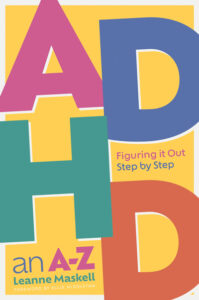
by Leanne Maskell
author of ADHD an A-Z and ADHD Works at Work
With years long waiting lists for NHS assessments, and an overload of information online, it’s normal to feel overwhelmed if you think your child has ADHD.
From confusion around the pros and cons of ‘labelling your child’, to untangling advocacy and ensuring they can access the support they need, it can be very stressful for parents, let alone the children they’re trying to help.
However, a formal diagnosis isn’t necessary – if you think your child has ADHD, this a great first step in being able to ‘name it to tame it’.
Here’s what else may be helpful:
1. Learn about ADHD
Research into ADHD has improved significantly over the last few years, showing how it’s not just for ‘naughty little boys’. It can be extremely helpful for parents to learn about the 30% developmental delay in executive functioning skills, such as self-awareness, impulsivity, and emotional regulation, enabling them to better understand their children through an ADHD lens.
Education provides empowerment and context. Instead of thinking a child isn’t trying, understanding ADHD can help you to see how they’re doing their best – and how to help them.
Learning about ADHD from credible sources such as books like ADHD: an A to Z can provide an overview of how this may impact your child, such as sleep, mental health, and organisation.
2. Talk to your child
Your child is the expert in themselves! Consider the reasons why you think they may have ADHD, and have an open conversation with them about this, depending on their age.
It can help to discuss challenges and strengths in a curious, collaborative, and compassionate way. Explaining that you’ve noticed some challenges and concepts like neurodiversity in accessible language can be very helpful for children’s self-esteem and sense of personal responsibility.
ADHD isn’t an excuse, but it can explain things. It’s important to involve your child in decisions affecting them, such as around diagnosis or medication.
3. Understand your options
Only a qualified medical professional can formally diagnose ADHD, and waiting lists can be very long, but it’s always worth speaking to your GP about any challenges to understand your options.
You have a legal ‘Right To Choose’ the NHS assessor your child is referred to, and providers such as Psychiatry UK operate online, and offer significantly reduced waiting times.
It’s especially important to understand shared care agreements if you’re considering a private assessment (which can be very expensive).
It’s also important to talk to your child’s school. An Education, Health, and Care Plan (EHCP) can formalise the funding and provision of tailored help such as special educational support. Your child does not need a formal diagnosis to apply.
Even without an EHCP, schools can still offer support. As ADHD can be a disability, organisations may have a legal duty to make reasonable adjustments under the Equality Act 2010, regardless of a formal diagnosis.
Finally, your child may also qualify for Disability Living Allowance, even without a diagnosis. This is financial support based on the support your child needs in terms of care and mobility.
4. Tailor your child’s environment
Children with ADHD will thrive with predictable structure and routine. Establishing clear expectations and providing positive reinforcement can be very helpful – children with ADHD have been found to receive 20,000 more negative comments than their peers by age 12!
Breaking tasks into manageable steps, limiting distractions and encouraging physical activity can support concentration. Adopting a coaching approach can help your child to take responsibility for the strategies that help them to thrive.
It’s important to provide reassurance and psychological safety, as children with ADHD may be more likely to experience mental health challenges. Having ongoing conversations about their wellbeing can help to resolve challenges early, building their confidence in knowing that they are supported.
5. Seek support
Being a parent can be very difficult, let alone one trying to understand ADHD and provide the best support possible!
Remember that you’re already doing a brilliant job, and ensure you look after your own wellbeing, such as with therapy. You can’t give from an empty cup!
Parents with ADHD may find it very helpful to connect with one another, such as within a support group. Seeking out ADHD coaching for yourself can also really help with establishing strategies to help you and your child thrive with ADHD.
Although it’s tempting to want to provide all of this support to your child above yourself, if they’re not enthusiastic, it’s unlikely to be as effective as it would be with you!
You are simply doing your best with what you have available to you, and a supportive, loving parent will always be the best medicine. ADHD is lifelong – you h ave time to figure it out together!
ave time to figure it out together!
Leanne Maskell is an ADHD Coach, Director of ADHD Works and author of ADHD an A-Z and ADHD Works at Work











